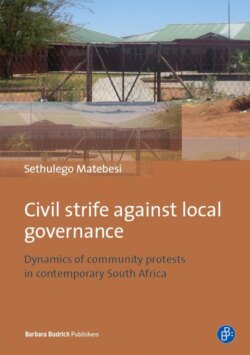Читать книгу Civil Strife against Local Governance - Sethulego Matebesi - Страница 8
На сайте Литреса книга снята с продажи.
ОглавлениеAcknowledgements
The conception of Civil Strife Against Local Governance can be traced back to almost ten years ago when the Centre of Development Studies (CDS) of the University of the Free State (UFS) – where I am a Research Associate - was contracted by the Centre of Development Enterprises (CDE) to conduct a few case studies on community protests, two years after the outbreak of the first protests in South Africa. The CDE is an independent policy research and advocacy organization and one of South Africa’s leading development think tanks, focusing on critical national development issues. Thus, my involvement in the CDE project piqued my interest in the broad field of social movements and in community protests, in particular. In this regard, I am grateful for the tutelage of my two good friends, Professors Lucius Botes (Dean of the Faculty of the Humanities) and Lochner Marais (CDS).
It would be remiss if I did not thank Professor Jackie Du Toit who encouraged me to apply for the Vice Rector’s Prestige Scholarship Programme (PSP), led by Professor Jonathan Jansen of the University of the Free State towards the end of 2010. To Jackie and the PSP team, it is commendable that you managed to generously devote time to the advancement of other scholarships. I am very happy to have been part of the programme and feel a great sense of achievement.
Importantly, this book would not have seen the light if it was not for the generous funding from the National Research Foundation (NRF) in South Africa and Erasmus Mundus EU-SATURN (EUropean - South African programme in TUning for Regional Needs in higher education). The funding from the NRF enabled me to conduct the research and, together with the EU-SATURN funding, enabled me to spend four months at the Department of Peace and Conflict Research (DPCR) of Uppsala University, Sweden from August to December 2014. I would like to thank the staff of DPCR for the exceptional collegial environment during my visit. In particular, I feel great gratitude towards my hospitable host, Professor Ashok Swain, who took a passionate interest in my research. He has contributed much to the shaping of ideas and on drafts of the book.
Special thanks go to Professor Hussein Solomon (an internationally renowned scholar on conflict and conflict resolution in Africa, religious fundamentalism and population movements in the developing world), who had a great influence on the design of the study by suggesting the inclusion of the Western Cape Province in order to discern the different political dynamics of community protests. I also feel great gratitude towards my colleagues at the University of the Free State, Andre Pelser, Doreen Atkinson, and Lochner Marais, for their helpful and insightful feedback on earlier drafts of the manuscript.
With such a daunting project, there is often the likelihood of becoming disillusioned. I would like to express my sincere appreciation to all my colleagues at the Department of Sociology for affording me the space and time to accomplish this project. I am particularly grateful to Leane Ackermann whose constant words of encouragement have not gone unnoticed. I also owe a special debt to Malilimala Moletsane who ensured the consistency and completeness of the bibliography, Eleanor van der Westhuizen of the Research Directorate at UFS for her occasional guidance during the early stages of the study, as well as the current affairs teams of Motsweding FM (in particular David Magae), Motheo FM and various other radio stations and newspapers for the platform provided to share my ideas with their listeners.
I acknowledge the valuable contribution of officials of the Provincial Departments of Cooperative Governance and Traditional Affairs (or Local Government), the South African Local Government Association, leaders of civic groups and residents in the case study areas in the Free State, Northern Cape, North West and Western Cape Provinces of South Africa. In this regard, the contribution of a dedicated fieldwork team which, at various times, included Delsy Mashele, Keketso Raleie, Khotsofalang Makae, Thabo Kototsi, Pelonomi Tsoeu, Seipati Moleme, and Tshegang Maputle, is recognized.
I have been fortunate to have the help and advice of Professor Pumla Madikizela-Godobo (a Senior Research Professor in Trauma, Forgiveness and Reconciliation Studies) who helped me connect with my publisher and has supported the development of Civil Strife. Thanks to the Barbara Budrich team led by Sarah Rögl for their guidance throughout the process. I also thank the anonymous peer-reviewers for their invaluable comments and criticisms, as well as the Municipal IQ who gave permission to reproduce Figure 1 in Chapter 1 on the prevalence of community protests between 2004 and 2016. I also express my sincere gratitude towards Naledi Gouws of Star Language Services for the proofreading of most of the chapters.
Finally, I would like to express my appreciation to my family who supported me during both the fieldwork and the writing of the book. In this regard, special thanks to my wife, Lesego, daughter, Puleng, and son, Tshiamo. Ke a leboga bagaetsho!
